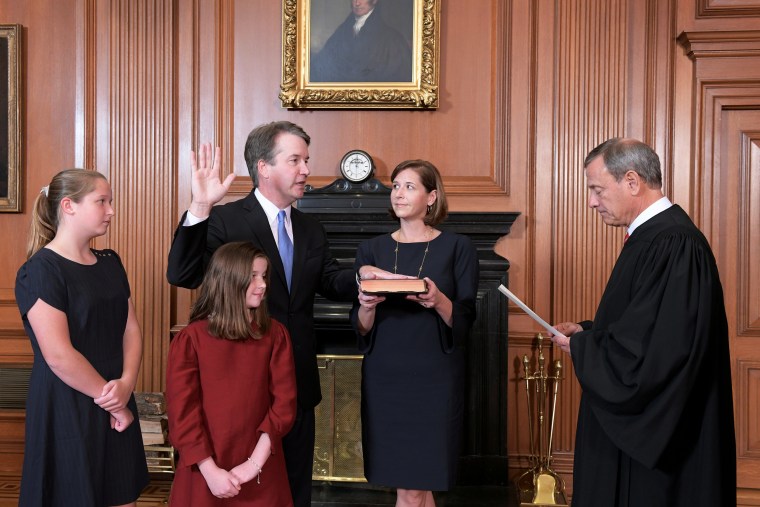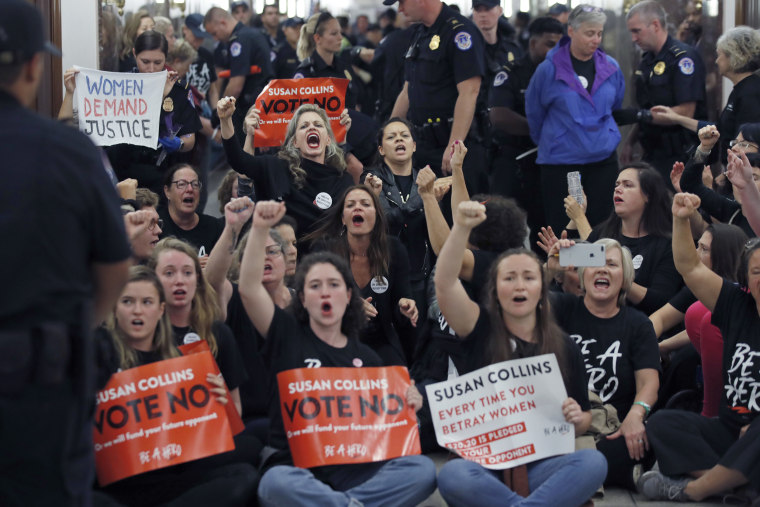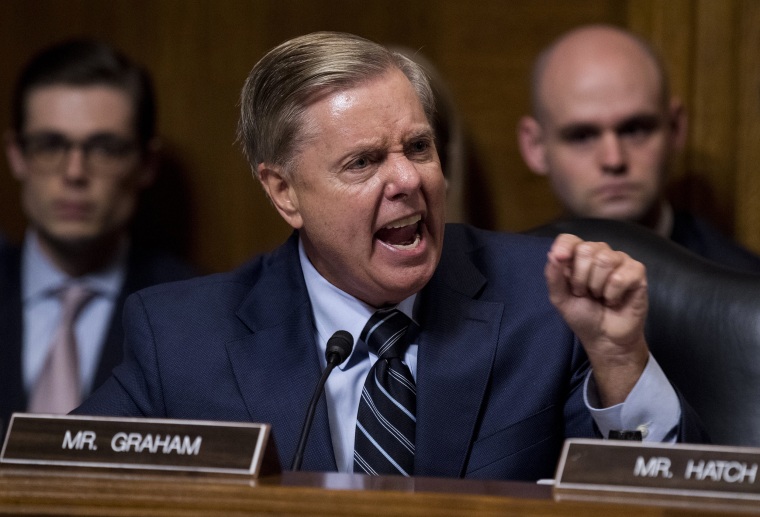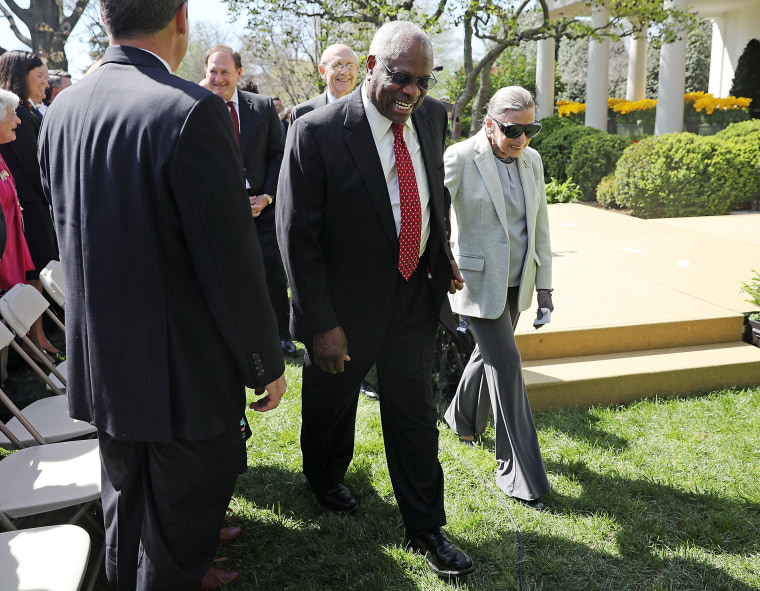
WASHINGTON (NBC NEWS) – Brett Kavanaugh joins the Supreme Court as damaged goods, dogged by questions about his integrity that he may never be able to outrun — casting a pall over the institution for a long time to come, high court experts said.
“I don’t think he’ll ever be able to disassociate himself from what just happened,” said Benjamin Barton, a professor at the University of Tennessee College of Law. “For Kavanaugh, this is a first-paragraph-of-his-obituary type of situation. He’s going to be known for this and stuck with this for his career.”
Barton added, “Every single case that he is on, people will say, ‘Hmm, I wonder what Kavanaugh decided for this?’ When we have a whole string of 5-4 decisions with Kavanaugh on there, it will make it seem like a partisan body, which is terrible for the Supreme Court and bad for the country.”
NBC News spoke with eight court watchers, including academics, former clerks and ex-legislative aides to get this take on the court’s newest member as he begins his work on the court this week.
All of the experts, regardless of political leaning or judicial philosophy, offered a stark prognosis for Kavanaugh and for the court: That his reputation as a jurist has suffered, perhaps irreversibly; that the perception he can rule fairly on several hot-button issues has been diminished; and that the public’s view of the fairness of the court will drop, possibly precipitously. A few, however, said the only thing, if anything, that would ever have the chance of healing the judicial wound would be the simple passage of time.
The court watchers said they were shocked at the nominee’s unsteady, fiery temperament during his testimony and his open partisanship and defiance of Democrats on the Judiciary Committee.
Barton, a former clerk for a U.S Court of Appeals judge and the author of well-known 2012 study that examined the personal pre-Supreme Court backgrounds of justices, noted that even if the “actual integrity” of the Supreme Court ends up being unharmed by Kavanaugh’s presence, damage will be done.
“The perceived integrity of the court matters just as much,” he said. “And for the perceived integrity of the court, this is a disaster.”
‘SIGNIFICANT CLOUD’
Wendy Weiser, who directs the Democracy Program at the Brennan Center for Justice at New York University Law School, a left-leaning law and public policy center that takes no position on nominees, went further, arguing that Kavanaugh would, in fact, “harm the actual credibility, legitimacy and authority of the U.S. Supreme Court.”
“The process throughout this entire nomination creates a serious risk for the court’s legitimacy,” she added. “And it’s not going to go away.”
For Weiser, it wasn’t just about Kavanaugh’s “injudicious comments” about drinking, his “visible lack of respect” for Sen. Amy Klobuchar, D-Minn., or his “highly partisan” statements during the hearing — although she said those were all were to his detriment.
“Cases dealing with women’s rights and gender issues are obviously going to be questioned,” Weiser said. “But honestly my concern is what he does to the court writ large. If half the country believes one of the members of the Supreme Court committed sexual assault and lacks integrity, that is going to taint the perception of all the court’s rulings.”
A court with Kavanaugh on it has a “permanent taint,” she concluded.

Anil Kalhan, a professor at Drexel University’s Kline School of Law and a former clerk to two federal judges, said for all the issues with the confirmation process, it was Kavanaugh’s appearance before the committee that would “cast the most significant cloud.”
“I think it just puts his partisanship front and center,” Kalhan said, referring to Kavanaugh’s claims that the “national disgrace” of a confirmation process was caused by opposition from “the left” and based on “revenge on behalf of the Clintons.”
“He may have been entitled to anger and raw emotion, even indignance based on what happened to him,” Kalhan added. “But the partisanship and then his hostility and manifest disrespect to senators? It doesn’t inspire a lot of confidence. This is as close as we have been to a potential legitimacy crisis as I can think of in my lifetime.”
LIKELY TO WORSEN
Partisan tensions already surrounding the Supreme Court are almost certain to worsen, several experts said.

Some Democrats have threatened — if they take back the House or the Senate in November — to launch further investigations into the allegations against Kavanaugh, with some even throwing around the possibility of impeachment proceedings.
Kalhan and others offered one solution that they said could possibly lessen any damage done to the integrity of the court: Avoiding hot-button issues for a time.
“At the end of the day, this could turn on what the court is doing,” Kalhan said. “If the court is engaging in topics that are not of major concern to large segments of the population, then maybe it can blow over. But if it’s rendering controversial decisions about the right to have an abortion, or contraception or religious freedom issues, that’s not likely.”
Some said they doubted Kavanaugh would recuse himself from such cases, but believe it’s an idea worth considering.
THE CASE OF CLARENCE THOMAS
On the other hand, some of the experts that NBC News spoke with said they believed public perception of the Supreme Court would recover after an extended period of time.
Michael Dorf, a professor at Cornell Law School and a law clerk to former Supreme Court Justice Anthony Kennedy, predicted the saga would affect public regard for Kavanaugh “at least for some period of time, a couple of years,” but he added, “Over time, memories will fade and other issues will gain greater prominence.”
To make their point, Dorf and others said they believe that Clarence Thomas has largely outlived the controversy over his 1991 confirmation, when Anita Hill made sexual harassment allegations against him.
“Most voters don’t know much about the court, and they will forget,” Dorf said. “We now routinely talk about decisions rendered by Justice Thomas, or his dissents and his conservative jurisprudence. Not as much about Anita Hill.”
Barton, of the University of Tennessee College of Law, agreed, but pointed out how, just because the Hill-Thomas hearing didn’t permanently damage the justice’s reputation doesn’t mean it didn’t have a large affect on his demeanor and style on the bench.
“He has kept a low profile, he hardly ever speaks during cases,” Barton said — Thomas didn’t ask a question from the Supreme Court bench for 10 years during oral arguments, ending his run of silence in 2016.
Kalhan, of Drexel’s Kline School of Law, however, disagreed that the passage of nearly three decades had provided “any kind of roadmap back to acceptability” for Thomas.
“Things didn’t blow over for Clarence Thomas, people still talk about Anita Hill,” he said. “And the idea that Thomas’ situation didn’t have political consequences isn’t true. It motivated women and Democrats in 1992. It was ‘The Year of the Woman'” — when nearly 50 women were elected to the House and six to the Senate.

And Weiser, of the Brennan Center, said comparisons can’t be drawn between Thomas and Kavanaugh because the latter “is happening during a very different time, during a time of national reckoning of sexual assault, in the midst of #MeToo, during a time when people thought and expected we had moved forward and will move forward.”
llya Somin, a professor at Antonin Scalia Law School at George Mason University, referred to another past high-profile instance where partisan politics intersected with the court — the Bush v. Gore ruling that decided the 2000 presidential election.
“There are a history of situations where people say, ‘This will affect the permanent legitimacy of the court’ — that happened after Bush v. Gore, and while people certainly talk about it, these did not end up have a long-term impact on the perception or the legitimacy of the court,” said Somin.
But several experts agreed that things seem different this time, due to the seriousness of the the allegations, as well as Kavanaugh’s handling of them.
“The allegation by Anita Hill against Clarence Thomas, while serious, did not involve conduct nearly as harmful as that alleged to have been committed by Kavanaugh,” Dorf noted.
“So, in that sense, you could see it being a cloud over him,” he said. “For a long time.”

